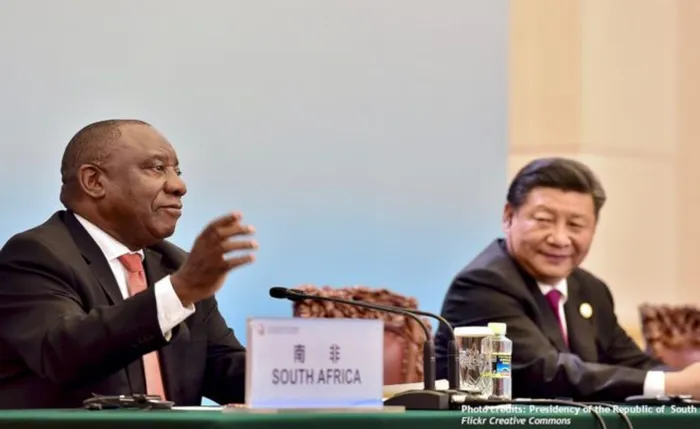Dar es Salaam Consensus sets agenda for Focac

President Cyril Ramaphosa, left, and President Xi Jinping at the Focac. The theme, China-Africa Practice: Building a Community with a Shared Future, underlines the strategic compatibility of China and Africa in the current global context, hence the need for the two parties to work hand in hand to chart a future in which their respective peoples will thrive, the writer says. – Picture: Presidency of South Africa / Flickr / Creative Commons
By David Monyae
The 13th edition of the China-Africa Think Tanks Forum, which brings together think tanks, academics, and other stakeholders from China and Africa, was held in Dar es Salaam, Tanzania in March under the theme: China-Africa Practice: Building a Community with a Shared Future.
This was an apt theme that underlines the strategic compatibility of China and Africa in the current global context, hence the need for the two parties to work hand in hand to chart a future in which their respective peoples will thrive.
The meeting produced a seminal document titled: The Dar es Salaam Consensus: African and Chinese Think Tanks on Deepening Global Development Co-operation (hereafter the Dar es Salaam Consensus).
The document reaffirmed the principles and values that have long underpinned the China-Africa relationship, namely mutual respect, openness, win-win co-operation and common prosperity. These principles have been the foundation of the thriving Sino- African relations.
The Dar es Salaam Consensus further emphasised the prioritisation of people-centred development and the need to implement the Global Development Initiative, which is a widely embraced proposal by Chinese President Xi Jinping.
The emphasis on prioritising development is especially relevant for Africa, which is still suffering from widespread poverty with over a third of the population (about 35 percent) reported to be living in extreme poverty. China is now Africa’s most important development partner through trade, investment, development finance and programmes such as the Belt and Road Initiative (BRI).
The BRI – a global programme aimed at connecting countries in Asia, Europe and Africa through infrastructure development – has helped to improve Africa’s infrastructure across the energy, transport and communications sectors. Over 49 African countries and the African Union Commission have joined the BRI.
China has also been active in the social development sector in African countries, having conceived and implemented numerous successful social development initiatives through building schools, hospitals, training centres, and other social infrastructure across the Continent.
Crucially, the Dar es Salaam Consensus underscores the importance of countries pursuing their modernisation programmes and policies informed by their national circumstances and cultural characteristics. The world has seen the failure of imposing foreign development models on developing countries.
Far from achieving development, Western instigated Economic Structural Adjustment Programmes set African countries’ development back and, ironically, created more poverty instead of eradicating it.
As such, it is important that countries be allowed to pursue their own development and modernisation programmes while learning from countries like China that have successfully eradicated extreme poverty. Further, the Consensus also called for the democratisation of the international system which for a long time has been dominated by a few countries in the West while marginalising the rest of the world, especially Africa.
Africa does not have representation in the United Nations Security Council, which is the most powerful organisation of the global body whose decisions have an impact on the continent. African leaders have long called for the granting of two permanent African seats at the UN.
African countries also lack an effective voice in key institutions of global economic governance such as the International Monetary Fund (IMF), the World Bank and the World Trade Organization. It is critical that China and Africa continue to call for the reform of these institutions so as to create a more just and equitable global economic system in which all countries enjoy common prosperity.
African countries have been left in crippling debt crises because of the lending practices of the IMF and the World Bank which leave them unable to pay back their debts. Hence, there is an urgent need to redesign the international financial system to enable it to play a developmental role in developing countries.
As its contribution to the reform of international financial architecture, the Consensus pledged to establish an international credit rating agency under the auspices of the Forum on China-Africa Co-operation (Focac) and BRICS. The stakeholders at the meeting also reaffirmed the values of national sovereignty, territorial integrity and the right to development.
The Consensus also urged the world to pay attention to traditional and non-traditional security threats while appealing for the resolution of conflicts and disagreements through peaceful dialogue. The Global Security Initiative, which was also proposed by President Xi, could play an important role as a guide to the realisation of a more peaceful and stable world.
Overall, the Dar es Salaam Consensus is a progressive document that could positively influence the global agenda. It also sets the right tone for the upcoming Focac gathering, which is set to take place later this year in China.
Dr David Monyae is Associate Professor and Director of the Centre for Africa-China Studies at the University of Johannesburg